Since its release on April 7, Prime Video’s First African Original movie, Gangs of Lagos has generated a lot of controversies and mixed reactions from different bodies in Nigeria.
The movie which was co-produced by Jade Osiberu and Kemi Lala-Akindoju follows the story of three friends who grow up in Isale Eko on Lagos Island and having been dealt a major blow by destiny, they eventually find themselves in a dangerous power tussle.
As the name suggests, Gangs of Lagos portrays the violence and mischief that permeate the political scene of Nigeria where youths are used as tools of political thuggery as narrated through the lens of Isale Eko area of Lagos.
According to critics of the movie, especially indigenes of Isale Eko, the primary setting of the movie, Gangs of Lagos did not capture the true essence of Isale Eko. They are of the opinion that the movie painted the affluent area of Lagos in a bad light, especially in the cultural portrayal of the Eyo masquerade.
For context, the movie opens with an Eyo masquerade also known as Adamu Orisha play leveraging a period of festivity to assassinate a soon-to-be-known opponent in his home in the presence of his wife and infant.
At the climax of the movie, a group of Eyo masquerades also attempt to assassinate a party attendee to avenge the murder of the deceased whose death is being celebrated.
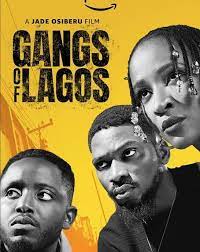 Lagos State Government and other custodians of the Adamu Orisha play frowns at the use of the Eyo masquerade as a gun-wielding villain and an object of assassination in the the movie. According to them, that was a misrepresentation and mockery of the Isale Eko cultural heritage and symbol- the Eyo masquerade. They also maintained that the movie is a defamation of the people of Isale Eko community.
Lagos State Government and other custodians of the Adamu Orisha play frowns at the use of the Eyo masquerade as a gun-wielding villain and an object of assassination in the the movie. According to them, that was a misrepresentation and mockery of the Isale Eko cultural heritage and symbol- the Eyo masquerade. They also maintained that the movie is a defamation of the people of Isale Eko community.
Following this, a series of statements were released to address the situation while some called for the banning of the movie from all online platforms.
In a statement signed by the Commissioner for Tourism, Arts and Culture, Uzamat Akinbile-Yussuf, the State’s government noted that “the production of the film is very unprofessional and misleading, while its content is derogatory to our culture. It is an unjust profiling of a people and culture as being barbaric and nefarious. It depicts a gang of murderers rampaging across the state.”
Similarly, the Isale Eko Descendants’ Union (IDU), a cultural group representing the descendants of the original inhabitants of Lagos Island, also expressed their disappointment with the portrayal of the Eyo masquerade in the movie.
The Chairman of the group, Yomi Tokosi, in a statement wrote, “In the movie the unique Eyo masquerade indigenous to the Isale Eko community in Lagos was illegally and scandalously depicted as being used as a camouflage, decoy and subterfuge for murderers and gangsters operating in the Isale Eko area.”
“The Isale Eko descendants’ union is very disturbed that the culture and tradition of Isale Eko can be wantonly exploited in such a despicable and insensitive manner by amazon and prime video to the detriment of the Isale Eko community.”
Meanwhile, the Akinshiku of Lagos Chief Adebola Dosumu also wrote in a statement: “The film titled “GANG OF LAGOS” portrayed this our noble Tradition and Culture as a notorious criminal for nefarious activities and thereby misrepresent our culture and tradition to the entire world, which is disrespectful to the people of Lagos and by extension, the Government of Lagos State that promote the Eyo as a cultural symbol of the State.”
A LOOK AT ADAMU ORISHA aka EYO MAQUERADE
The Eyo masquerade, also known as the Adamu Orisha Play, is a traditional festival indigenous to the Isale Eko people of Lagos State.
The Eyo masquerade is an important and highly-revered cultural heritage of Lagos State.
It has become an important symbol of the cultural heritage of the Isale Eko people of Lagos since 1854.
Originally, the Adamu Orisha play is a cultural celebration that honour the spirits of ancestors or kings who have passed on.
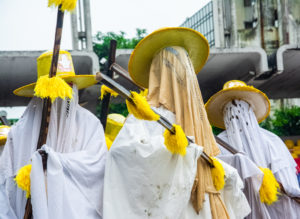
Eyo masquerade. Photo Photo credit: Wikimedia Commons
Over time, the Adamu Orisha becomes a symbolic cultural activity during significant events such as weddings, funerals of important figures in Lagos State, and the installation of a new king. Unlike other annual cultural festivals, the Eyo festival is not a fixed event and the masquerade is not meant to be seen only once in a year. There is no limit to the number of times they can grace, by their presence, the event of true sons and daughters of Isale Eko.
During a cultural event, their presence is often characterized by a performance that involves a group of men dressed in white robes and adorned with colorful hats and masks. The hats of different colours differentiate the masquerades from each other. Descendants of kings and families known as ‘Iga’ all have unique Eyo masquerades who are respectfully represented during the event each donning their peculiar colour of hat ranging from purple and red to green and yellow.
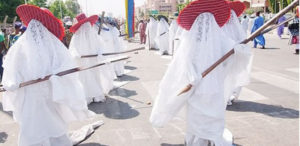
Eyo Iga Etti procession at the Eyo festival at Tafawa Balewa Square in Lagos
Their performance involves a procession through the streets of Lagos Island, which was the first contact of the Eyo, with the performers chanting and dancing to the sound of drums and bells.
The procession is often led by a chosen individual known as the ‘Adimu Orisha’, who is believed to be possessed by the spirit of the ancestors. He is accompanied by other performers known as ‘Eyo-ade’, who is also believed to be possessed by ancestral spirits.
The white robes and masks worn by the performers are believed to represent purity and the spirits of the ancestors.
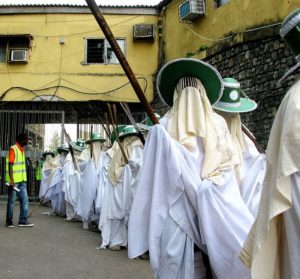
Eyo Iga Sasi procession at the Eyo festival at Tafawa Balewa Square in Lagos
Like other symbolic cultural festivals, the Eyo festival has rules and orders known as taboo bidding the event to which attendees are expected to adhere to and failure to comply often leads to consequences.
Attendees at the festival must not put on footwear, or headgear, and women must not plait ‘shuku’ hairstyle to the event and other taboos.
Also, women are forbidden from seeing a particular masquerade during the festival hence when the announcement is made about the coming of the masquerade, women are often seen running helter-skelter with their faces buried in the ground. Violators of these taboos are often flogged and punished by the performers.
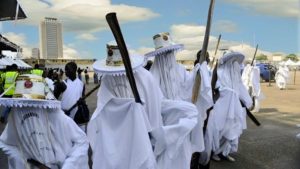
Eyo Olokun procession at the Eyo festival at Tafawa Balewa Square in Lagos
Therefore, it is important to note that the festival is a deeply sacred event, and visitors are expected to respect the cultural significance and symbolism of the masquerade.
However, despite all the criticisms from the indigenes of the state, several other people hailed and applauded the producers and the cast of the movie and referred to it as a masterpiece. Fans of the movie said the movie “makes an excellent attempt at the untold story of street life, gangsters, and politics in Isale Eko.”
While it is true that the movie opens up the hidden secret of God-fatherism in Nigerian politics, it is a common knowledge that politicians utilize jobless youth and those who could not further their education due to financial constraints as weapons of political thuggery as portrayed in the movie.
These are mostly people who send their children to school abroad while other people’s children are used for their political gains. More often than not, the thugs take the fall for whatever mischief that may occur during the tussle for power – typical demonstration of “When two elephants fight the grass gets trampled”.
Speaking on the call on the National Film and Video Censors Board, NFVCB to withdraw the movie’s approval, the Executive Director and CEO of the regulatory body, Alhaji Adedayo Thomas, said the board can’t take any action against the movie for now.
According to him, since Gangs of Lagos is not being seen in any cinema or exhibited in any open space, the body has no legal backing to regulate its exhibition on the online platform.
Amidst the controversies, fans and lovers of Gangs of Lagos have been demanding that the part two of the movie be released sequel to the open-ended mood the movie ended.
Now our question is- will the producers of Gangs of Lagos continue to produce the part two or will they bow to the pressure from critics of the movie?


